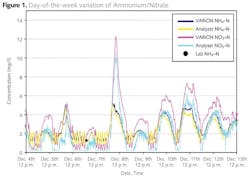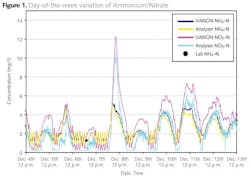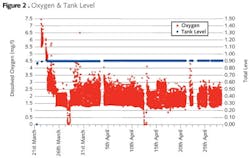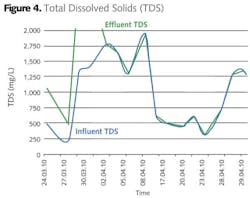Russia's water market may have reached over $900 million in 2010, but required urgent facility and technology upgrades mean the sector will double in value by 2017. Paulina Szplinska addresses the necessary changes and shift towards the development of ultraviolet, ozone and membrane separation treatment and a decrease in traditional chlorine disinfection.
Russia owns 25% of the world's fresh water. Neglected natural resources during the Soviet era decades, however, has resulted in heavily polluted water bodies. In addition, water infrastructure in Russia is facing severe problems connected with physical degradation and inefficiency. Despite the fact that 90% of the population is covered with water services, over 40% of supply network is in urgent need of refurbishment and modernisation. How soon will Russia overcome challenges and modernise its water infrastructure?
Pollution prevention and improving degraded infrastructure
Russian water and wastewater infrastructure is characterised by a high degree of wear and tear, with the depreciation level of water utilities infrastructure reaching 65% in 2010. This share is expected to rise by 2% to 3% annually unless no action is taken.
The immediate result is high water losses accounting for almost 50% of overall water supply. Furthermore, there's a high rate of service breakdowns, resulting in five to six accidents per km of water network, with a 10% increase annually. Despite the critical situation of infrastructure, the answer was a meager replacement of 1% of water supply pipes and less than 0.5% of wastewater pipes per year.
Another major concern is the low level of water and wastewater treatment. Operators of water utilities in Russia cannot always guarantee safe and continuous drinking water supply. In some cases, especially outside big cities, applied traditional water treatment technologies are insufficient to fully remove high level of contamination. In the case of wastewater treatment, huge improvements are also required, with only 10% being treated according to national sanitary standards and almost 17% of wastewater discharged into water basins without any treatment.
In light of the above circumstances, Russian water and wastewater infrastructure is in critical condition and requires large scale modernisation. Necessary investments are mainly connected with the reconstruction of existing supply and discharge pipelines, as well as the introduction of advanced treatment technologies to improve water purification and eliminate risks of environmental pollution from untreated wastewaters.
Privatisation plans and Russian "Vodokanals"
Water supply and wastewater treatment in Russia is managed by "Vodokanals". The progressive decentralisation process of water and sewage utilities (WSU) brought the decision-making process closer to local conditions. It did however create difficulties of sudden disintegration of Ministries of Communal Services, over-fragmentation of the sector and creation of more than 800 Vodokanals. Currently 84% of Vodokanals are operated by largely ineffective and commercially unviable municipal enterprises.
The level of private business participation is relatively low but the Russian Government is attracting private investors to facilitate the modernisation of water infrastructure. One of the biggest challenges of WSU operators is that the revenues generated on water bills are typically insufficient to cover not only critical capital investments but also operational costs. Average water and wastewater tariffs in Moscow are just a third compared to other major Central and Eastern European cities. And tariffs in other Russian cities are even lower.
Inefficient water tariffs causes severe under-financing of Vodokanals as well as unreasonably high water consumption. Consumption of drinking water in Russia, especially in big cities is more than twice the European average. And the Russian private water services market is a relatively new industry with the first private operators having appeared in 2003. However, long-term Public-Private-Partnership (PPP) opportunities have opened the avenue for private enterprises both locally and from overseas to establish a strong local presence in the market and combine specific Russian experience, effective management and much needed financial resources. Therefore, private sector involvement and effective management are essential ingredients to enable the successful implementation of water sector reforms in Russia.
Investment and growth opportunities of the Russian Water Market
It is estimated that a staggering sum of approximately $11 billion is required to complete the necessary upgrades, refurbishment and new build for water and wastewater infrastructure in Russia. The Pure Water Federal Target Programme for 2011-2017, signed in December 2010, aims to increase coverage of water and wastewater services in Russian regions, to reach 95% for safe water supply coverage and 84% of wastewater collection and treatment in 2017. The program focuses on supplying the population with high quality fresh water and improved sanitation standards, as well as the introduction of modern technologies for wastewater and sewage sludge treatment.
With massive capital requirements, the implementation of the Pure Water Programme is a challenge since the federal, regional and local budgets are projected to contribute only about 6% of the Programme funding. Because of the size of private investment requirement, Russian government encourages foreign participants in the development of the water and wastewater sector in Russia and it is positively looking at private capital contribution to the industry modernisation. As the Pure Water Federal Target Programme is aimed at promoting innovations and development throughout the water supply and wastewater discharge industry, it creates good opportunities for treatment equipment manufacturers and distributors. Potential exists also for pumps, pipes and chemicals suppliers, service providers as well as civil construction companies specialised in water-related works.
Russia water and wastewater sectors suffer from heavy state bureaucracy and a large number of formalities become a major long-term obstacle. The projects are often delayed because of complicated certification procedures, long decision making process and lack of prioritisation. Additionally, corruption is another factor influencing investment procedures, especially for foreign companies new to the Russian market. Cultural differences and a specific business climate can be off-putting for foreign companies. Hence it is important to have local personnel to better understand and deal with culture related challenges.
advanced treatment technologies
Over the coming years the main focus is on reconstruction of facilities and introduction of tertiary treatment for better nitrogen and phosphorus removal from wastewaters. A shift towards development of modern ultraviolet, ozone and membrane separation treatment is also expected in the water treatment segment, with decrease of traditional chlorine disinfection. Advanced treatment technologies have already been successfully implemented in large Russian metropolises, like St Petersburg where all drinking water is treated with ultraviolet technology before being supplied to the customers. It is expected that other Russian cities will follow this trend.
Increasing focus on sludge treatment is also projected in Russia for the coming years, concentrating mainly on reducing sludge volumes, safe storage and incineration. At present the incineration of sewage sludge is not a widely applied method in Russia. There are two sludge incineration plants in operation but it is expected to become more important, mainly for large metropolises dealing with disposal problems.
future opportunities
The Russian water and wastewater market has many challenges to face while the sector passes through reform, still anchored in the past, to meet all the targets of the Pure Water Federal Target Program. The key opportunity can be found in the necessity to upgrade existing infrastructure. Emerging interest in advanced solutions, such as membrane systems, ultraviolet, ozone and tertiary treatment creates good development prospects for the market participants.
Russian Vodokanals have already demonstrated an increasing interest in privatisation. Therefore, establishing a strong and long-term partnership with local partners enhances success and ensures access to the water and wastewater market. The highest growth potential of water and wastewater market development in the Russian municipal sector exists in cities with populations over 500,000.
Private investors to date have been mainly interested in big city projects, which are connected with large-scale modernisation of old infrastructure as well as construction of new facilities due to expansion of the cities. Development of large agglomerations is also supported by governmental funds as well as external financial institutions. Agglomerations with populations below 500,000 supported by regional funds, however, are relatively less attractive for private operators. As a number of PPPs are expected to increase in Russia, it will also facilitate a strong drive towards improved and operational efficient water and wastewater infrastructure in those cities. In the long-term perspective smaller agglomerations are also projected to attract investments once the large and medium sized cities are covered.
The key industrial Russian end-users such as power, oil and gas and mining are expected to help maintain the growth of the water and wastewater sector. Expansion of thermal and nuclear power capacity, as well as the global demand for oil and gas from Russia, are expected to drive demand for more energy efficient and compact treatment solutions, including water reuse and application of zero liquid discharge technologies. Furthermore, Russia's 2013 target to increase its coal production and build more coal-fired plants is expected to create opportunities for advanced wastewater treatment technologies, to help minimise the negative impact on water bodies. Additionally progressive aquisition in the food and beverage sector creates demand for high-end treatment products, especially since quality of water is the key focus in this segment.
Despite the harsh reality and necessity to overcome present challenges in the municipal and industrial sectors in Russia, perspectives for the water and wastewater market development over the coming years are highly opportunistic.
Author's note:Paulina Szplinska is an industry analyst at Frost & Sullivan. For more information on the Russian Water Market report, please contact Chiara Carella at [email protected].
More Water & WasteWater International Current Issue Articles
More Water & WasteWater International Archives Issue Articles







